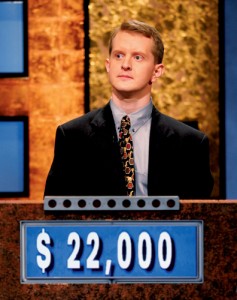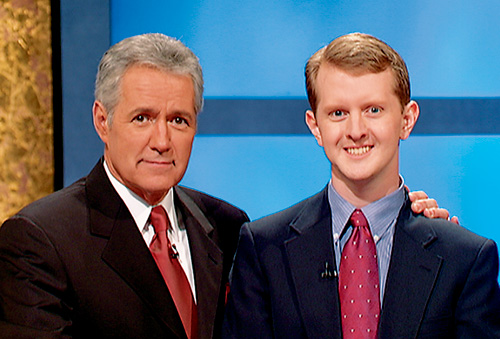For six months a BYU graduate kept winning, earning more than $2.5 million and captivating the nation with his quirky personality and mental acumen.

When Kenneth W. Jennings III, ’00, first learned he had been selected to compete in the long-running television game show Jeopardy!, the Murray, Utah, software engineer had three weeks to prepare. He began by watching the program while standing behind his recliner to get the feel of a podium and working on his timing by holding a child’s toy about the same size as a buzzer.
That simple strategy offers a small glimpse into the seemingly mild- mannered but highly competitive player who, in an unmatched six-month winning streak, became a game-show legend, smashing a bevy of records and sending 148 would-be Jeopardy! champions home after only one day.
Jennings left Jeopardy! after 75 games with more than $2.5 million in winnings. Such a streak elevated him to celebrity status and prompted an international media flurry from such heavyweight shows as The Late Show with David Letterman, Regis and Kelly, Nightline, and Good Morning America. Barbara Walters even linked Jennings to such stars as Oprah Winfrey and Mel Gibson by deeming him one of the Ten Most Fascinating People of 2004, and A&E featured him on Biography.
The champion credits much of his success to participating in quiz-bowl tournaments as a BYU student. “I can’t overstate how important quiz bowl was to me,” says Jennings, who hopes to see quiz bowl return to the university; it was cut during Jennings’ tenure on the team due to lack of funding. “Nearly a third of the answers I knew on Jeopardy! I knew only because of the collegiate competitions.”
After college Jennings watched many of his competitors from other schools appear on game shows and win enough money to pay off their school loans. “I said to myself, ‘That could be me.'” Within a few days of starting his Jeopardy! run he had easily surpassed the achievements of his former competitors.
“Ken Jennings has become the Joe DiMaggio of game-style shows,” says Steve Beverly, acting chair of communications arts at Union University and a passionate monitor, researcher, and writer of popular television. DiMaggio, fans remember, had a 56-game hitting streak in 1941 that has never been matched.
“I believe Ken Jennings will be remembered for a long time,” Beverly says. “You can’t call Ken the greatest player of all time—who knows what would have happened if some of those great past champions had not had a five-day game restriction? You can say, however, that he has been the most amazing player. He captured us with not only his talent for the mechanics of Jeopardy! but also his likable personality and boy-next-door quality. This engaging young man is the kind of person you would like to invite over for supper.”
That Jennings is smart is not a matter of debate. He taught himself how to read as a 2-year-old by sounding out the word stop at an intersection. “We heard a tiny, high-pitched voice exclaim, ‘That sign says stop!'” remembers his father, Kenneth W. Jennings Jr., ’78. “He had phonetically put the pieces together. His mother and I just sat in the front seat humming the theme from The Twilight Zone.”
By age 3 Ken was reading Laura Ingalls Wilder’s Little House on the Prairie books and at 5 was absorbing J.R.R. Tolkien’s Lord of the Rings. He was hooked on learning. When his family moved to South Korea, where his father worked for an international law firm, reading remained important.
“We like to use a sentiment from an early scene in the movie The Princess Bride,” explains his mother, Catherine. “We had a word for television in our house. It was called ‘books.'”
That Jennings is competitive is not in question, either. His quiz bowl teammate Earl J. Cahill, ’96, says, “Appearances can deceive. Ken seems calm but he is really competitive. When he loses, he’s not happy about it. On quiz bowl, Ken was our best player. He generally scored in the top 10 of all the competitors and would have scored higher if his teammates hadn’t grabbed so many points, too.”
“My son is very competitive,” agrees Ken’s father. “He sizes up his competitors and devises strategies. He went into the Double Jeopardy! round in third place only one time, and on that show, I saw a glint come to his eyes and his smile harden. He turned on the turbos and locked up the game by the end of the round.”
Jennings hopes his competitive success can help people realize that “academic competition is just as valuable as athletic contests.”
Madison U. Sowell, ’75, a BYU professor of French and Italian languages, coached Jennings on the academic quiz team in fall 1997 and admits, “All the class members were very sharp.” But on Jeopardy! he says, “The elements that made Ken so good were his breadth of knowledge, his retention, and his ability to recall quickly.”
Even with such an array of skills, Sowell says, “I was impressed as I watched him because of his humility. Usually people who are that smart, that quick, that competitive, that winning, are, frankly, quite prideful, but he just has that quality of humility so unusual in someone of such an obviously high IQ.”
It’s true Jennings came to Jeopardy! armed with intelligence, knowledge, personality—and a trigger finger. He also had the advantage of being the right age, says Beverly. “Because of the nature of Jeopardy!, contestants get quizzed quite a bit on contemporary pop culture. A 30-year-old may understand a lot about the classics, as will an older player. But usually the younger competitor will also have enough contemporary culture knowledge to respond to clues a 45- or 50-year-old wouldn’t know anything about.”
Jennings, born in Edmonds, Wash., grew up in Seoul, South Korea, and Singapore before returning to the United States in 1995 after serving his mission in Madrid, Spain. Both parents credit expatriate American schools for giving their four children superior educations. “They are the best schools in the world,” says his father. “People who pack up and go overseas to see the other side of the mountain tend to be bright, young, passionate educators. . . . I couldn’t ask for anything better for my children.”
In many ways Jennings seems a natural for Jeopardy! As a side job, he has worked as a writer producing questions for National Academic Quiz Tournaments. His NAQT specialty was literature and mythology, and, says his mother, “The breadth of his knowledge is almost frightening.”
Certainly Jennings’ life has been changed profoundly by his Jeopardy! experience. He has a book deal with Random House and a trivia board game coming out, and he will be on the speaker circuit. The impact of his success, however, may be even deeper.
“He certainly has become a cultural icon,” Beverly says. “I believe our country was desperately hungry for a Ken Jennings. We have been inundated with short-term celebrities who have gained attention for their mean-spirited, back-biting attributes. Those personalities have won a million dollars by deceiving and lying. What kind of secret to success is that? Ken has exhibited the dignity and personality to be the absolutely right person as a role model for learning.”
Adds his father, “We thought Ken would grow up to solve one of the mysteries of the universe, and he still may. We never thought our son would be a game-show champion. But I think Ken has made learning and being smart cool, which we hope will influence a generation of children.”
Read more about the Jennings Jeopardy! run.
The Jennings Jeopardy! Run

• June 2: Jennings first appears on Jeopardy!
• June 10: With $231,000 in total winnings, Jennings sets the record for Jeopardy! winnings in regular-season play.
• July 13: In his 30th episode, Jennings’ total reaches $1,004,960, making him the first regular-season Jeopardy! millionaire.
• July 20: Jennings’ 45 correct questions are the most ever in a single game.
• July 23: Jennings wins $75,000 in a single episode, shattering the old record of $52,000, and tops the second-place contestant’s score by $73,200.
• Sept. 13: Jennings’ 44th victory breaks a 24-year-old record of consecutive wins on a TV game show.
• Nov. 3: With total winnings at $2,197,000, Jennings passes the all-time single-game-show record set on Who Wants to Be a Millionaire?
• Nov. 24: Jennings offers his 2,500th correct question.
• Nov. 29: In his 74th-consecutive victory, Jennings’ winnings pass $2.5 million.
• Nov. 30: Jennings is defeated when he names FedEx instead of H&R Block as the company with 70,000 seasonal employees who work only four months a year. Subsequently, H&R Block offers Jennings free tax preparation and financial services for the rest of his life. He accepts.
Read more about Jennings here.









